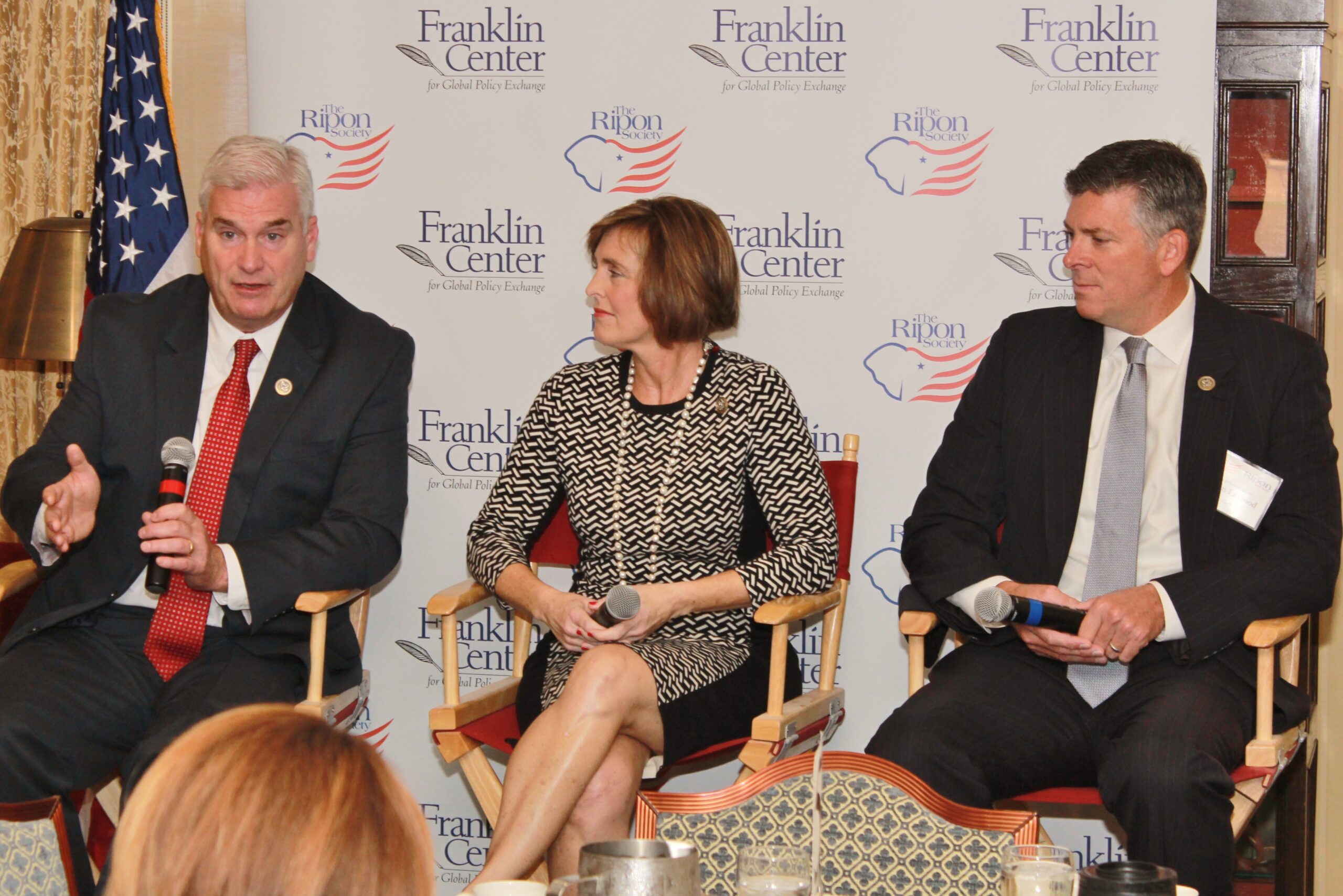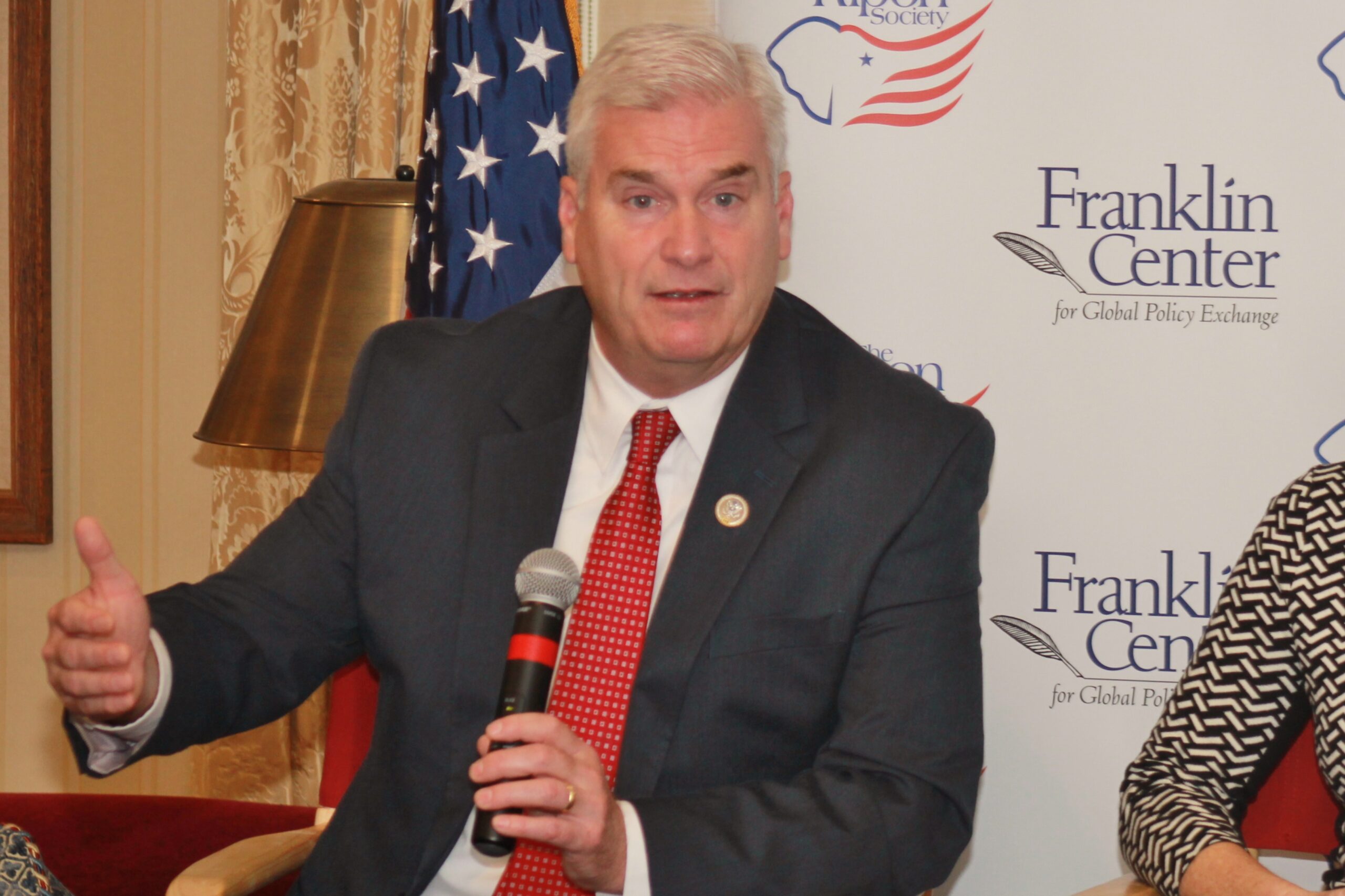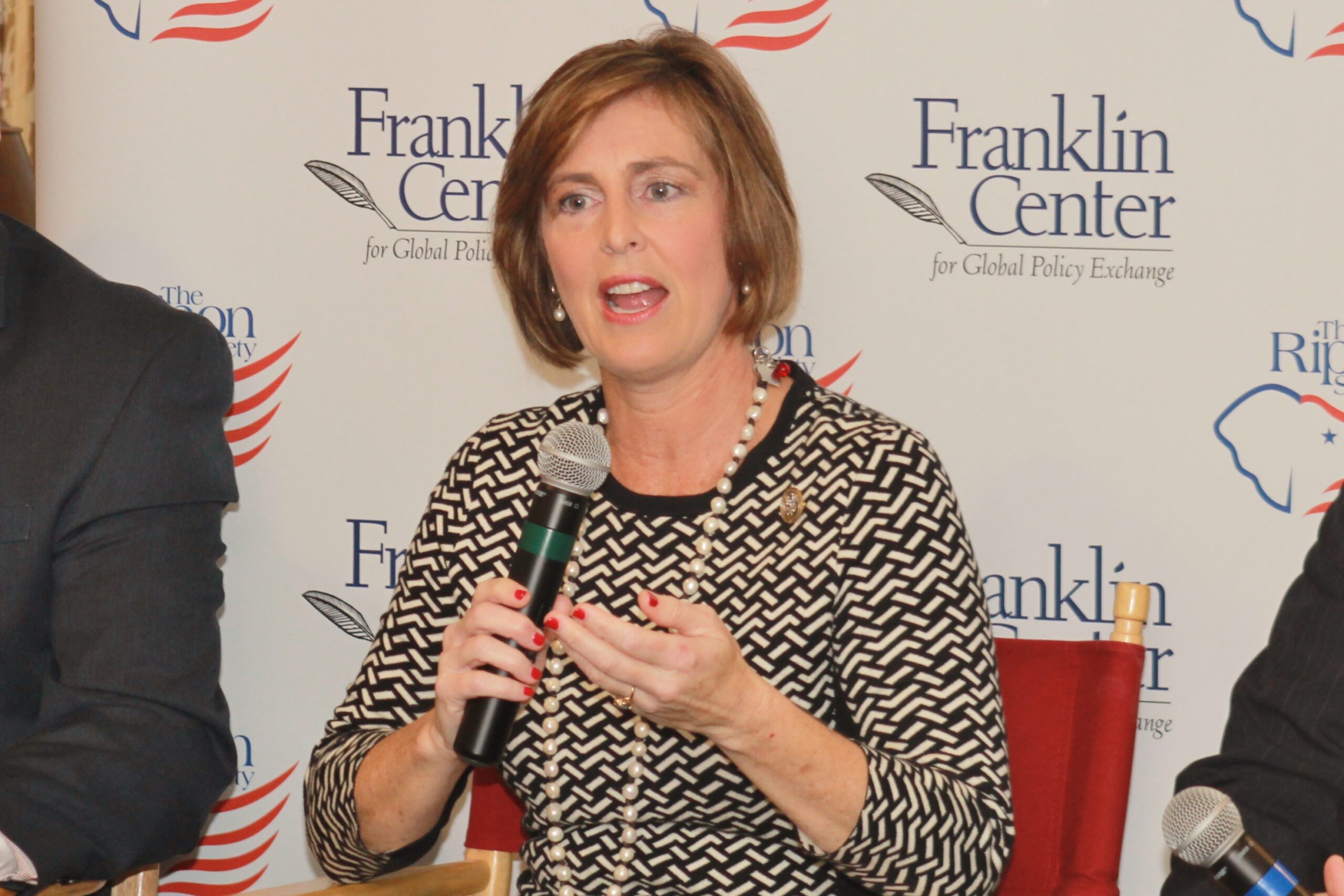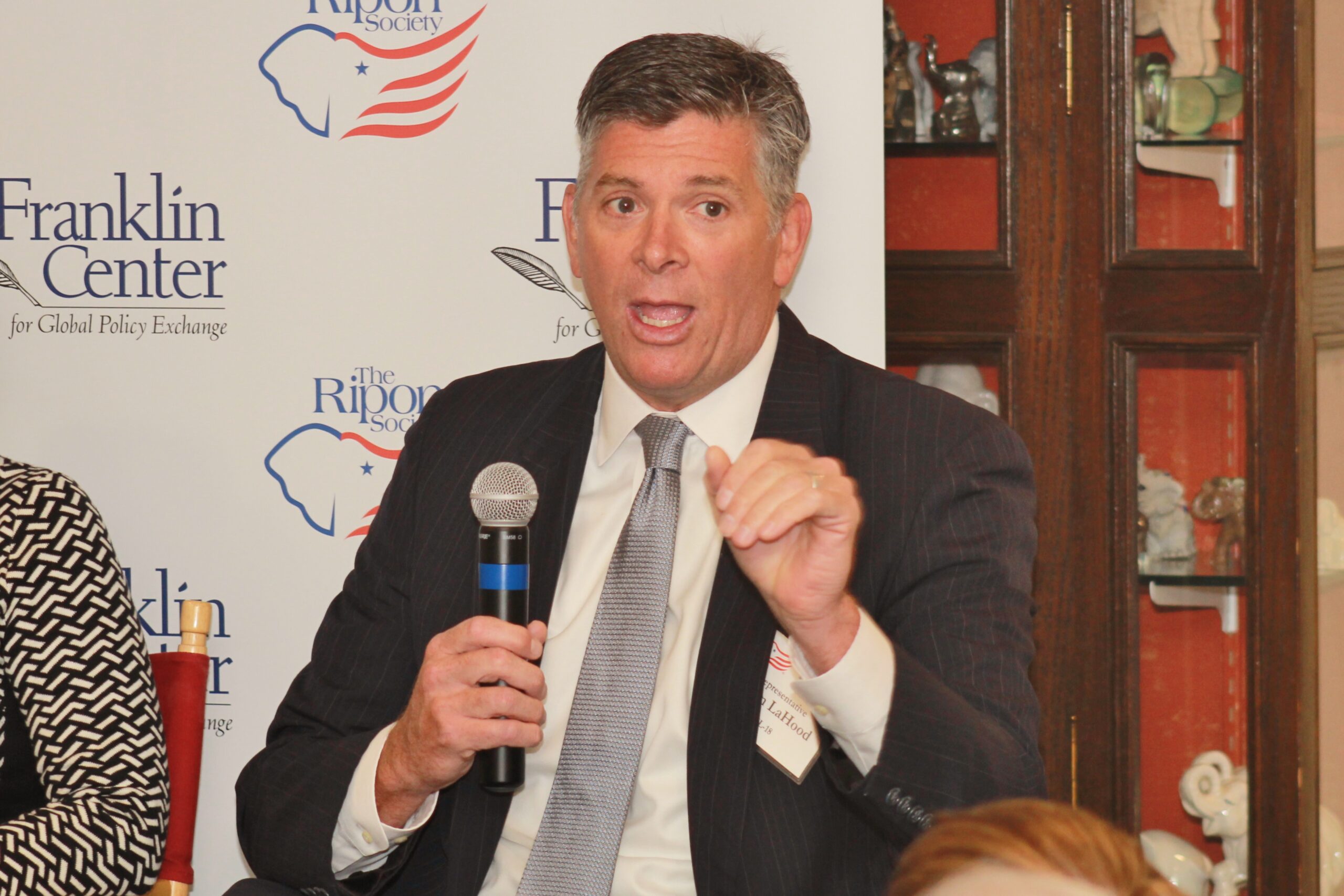 Emmer, Castor & LaHood Push to Reform U.S. Policy Toward Cuba
Emmer, Castor & LaHood Push to Reform U.S. Policy Toward Cuba
WASHINGTON, DC – With U.S. policy toward Cuba in a state of flux, The Ripon Society held a breakfast discussion yesterday morning with three Members of Congress who are working to end the Cold War-era embargo that has defined U.S.-Cuban relations for over 65 years and put in place a new set of economic policies that would bring certainty to the law and benefit both the people of Cuba and the United States.
The Members participating in the discussion included U.S. Reps. Tom Emmer (R/MN-6), Kathy Castor (D/FL-14), and Darin LaHood (R/IL-18). The three belong to the Cuba Working Group, a bipartisan caucus in the House that was established to promote increased trade, travel and investment in Cuba, while promoting human rights in that country and improving the security posture of the United States. Emmer helped found the group in December of 2015, and opened his remarks by discussing why someone from his state is interested in this issue.
“One of the first business groups to visit Cuba in the late ‘70s when President Carter was boosting up the travel restrictions happened to be a group from Minnesota,” he explained. “We are home to 17 Fortune 500 companies, and we have agriculture and manufacturing as the two primary drivers of our state’s private economy. Minnesota is all about trade, and we also have a population that is all about trying to help other people. So when [restoring relations with] Cuba was a possibility, you not only had folks going down to Cuba from Minnesota for commerce possibilities, but also to try to help.”
 Emmer was elected to the U.S. House in 2014 after serving six years in the Minnesota House. A member of the Financial Services Committee, he is the co-sponsor of legislation that would lift the Cuba embargo and allow for businesses in the private sector to trade freely with Cuba, while prohibiting taxpayer funds to be used on promotion or development of this new market.
Emmer was elected to the U.S. House in 2014 after serving six years in the Minnesota House. A member of the Financial Services Committee, he is the co-sponsor of legislation that would lift the Cuba embargo and allow for businesses in the private sector to trade freely with Cuba, while prohibiting taxpayer funds to be used on promotion or development of this new market.
“I came to Congress a couple years back with more of a Cold Warrior mentality,” he added, further expanding on his views. “I took a trip in June of 2015 to the island, and it completely changed my view of the people. They want a relationship with the United States of America. So I now talk about how important it is from an economic standpoint — the opportunity to travel, the opportunity for the hospitality industry, for our agriculture industry, for manufacturers. You can go down the list. But for me, the real issue is not repeating history.”
“This is more about our national security than anything else. We have an island that is 90 miles off of our Florida coast. It is in our backyard. It is a key to our relationships in the entire Western Hemisphere at this point in time. And we have people in our government today who still want to continue a policy that has frankly been an abject failure. Why? Well, because I guess they think doing the same thing over and over again and not getting a different result is not the definition of insanity … We put an embargo in to undermine the Castro regime, and in effect it has done just the opposite. It has empowered the Castro regime at the expense of the Cuban people — the very people we are trying to help. And so we’re going to keep doing this over and over? It makes no sense.”
As for the promotion of human rights, Emmer said that is a goal that can best be achieved with more U.S. engagement and a greater American presence on the ground.
“They made more advances in terms of human rights when Barack Obama took his delegation down to Cuba almost two years ago than had been made in years,” he stated. “You cannot change the human rights abuses if you are not on the island and if you are not present in creating some accountability and transparency. At the end of the day, this is what you have to look at. If we continue down the road we’re pursuing, you actually risk having someone else move into Cuba — someone who does not have the United States’ best interest in mind. Is it going to be China? Is it going to be Russia? Could it be the Iranians? Someone will fill that void if we are not there.”
Castor agreed.
“Think about how long this Cold War policy has been in place,” the Democratic lawmaker stated. “Over 50 years — the embargo and a bar on the ability of Americas to travel freely. Americans can travel anywhere in the world. Up until recently, you could go to North Korea. You can go to Iran and you can go to Syria. What is it about this policy that says Americans don’t have the fundamental right to travel that they enjoy everywhere else in the world? That’s wrong. The embargo’s wrong, and it’s outdated. It has outlived its usefulness and it is causing a lot of damage.”
 Castor was elected to the House just over a decade ago after serving four years as a County Commissioner in her Florida District. A member of the steering committee of the Cuba Working Group and cosponsor of the legislation to lift the embargo, she said her interest in the issue was sparked in part by working with local families with relatives back in Cuba who came to her for help in dealing with the outdated – and often unjust — law.
Castor was elected to the House just over a decade ago after serving four years as a County Commissioner in her Florida District. A member of the steering committee of the Cuba Working Group and cosponsor of the legislation to lift the embargo, she said her interest in the issue was sparked in part by working with local families with relatives back in Cuba who came to her for help in dealing with the outdated – and often unjust — law.
“The number one constituent matter in my office in Tampa was just trying to work through the bureaucratic red tape to try to get families to travel an hour away to see each other,” she recounted. “Whether it was the grandkids to see their dying grandmother for the last time, or I even had a case with a family with a brother who had cancer and the bone marrow match was his sister in Cuba. Just think about the agony they were going through, and then subjecting them to that kind of bureaucratic red tape and having to fight with the State Department and others just to try to get them on that hour-long flight. It was very eye-opening to me. That’s what helped me take on this issue, because I think that if we are going to improve human rights on the island of Cuba and improve business opportunities here in America and in Cuba, we’ve got to go full bore on the policy of engagement and turn the page on these Cold-War policies of the past.
“We fought a war with Vietnam, reconciled, and now Vietnam – in their economic output and in our relationships — is much healthier. Yet Cuba, 90 miles off the coast of the United States, remains stuck. I often think that it’s the governments that get in the way — the U.S. government and the government of Cuba. I think the Obama policy was right to empower everyday Cubans. In the times that I’ve traveled earlier in my Congressional tenure and years later, I’ve seen a dramatic change in the ability of cuentapropistas — small business owners — to build businesses, employ folks, and give them a new lease on life.
“The wages there are very low except in the sectors where the Cuban government has allowed openings. Whether it’s in restaurants or in the Airbnb space or some technology, these folks are creative and dynamic and they need support. By closing down the ability of Americans to travel or putting pressure on their families not to send remittances or blocking the ability of American businesses to partner with them, it is simply counterproductive in this day and age.”
LaHood was elected to the House in 2015 after serving four years in the Illinois State Senate. A member of the Joint Economic Committee and Committees on Science and Natural Resources, he said his interest in reforming U.S. policy toward Cuba is, like Emmer and Castor, also driven by the needs and interests in the people he represents back home.
“For me, it’s about jobs and economic opportunities,” the Illinois Republican declared. “Of the 435 congressional districts, ours is the 9th largest in terms of corn and soybean production. Caterpillar is headquartered in our district, as is John Deere and ADM. I look at the economic opportunities, and what trade has done for a district like mine. Cuba is a very small market, but to be able to load up grain on the Mississippi River and the Illinois River and go down through the Gulf and go to Cuba from there — it’s an opportunity for us. My conservative farmers and the folks who live in my district, they understand it. They get it. They ask, ‘Why can’t we do this? Why don’t we have a market? Why don’t you open this up?’ You try to explain to them the reason for that, and it’s difficult to do.
“Listen, we all believe in human rights. We believe in democracy. We don’t like dictators. We don’t like what Castro and his regime have engaged in. But trade helps all boats rise. We’ve seen that around the world. Engagement, economic opportunities, and economic freedom – they all help countries get out of that socialist mentality.”
 Following their remarks, the three members were asked a number of questions, including one about the prospects that the embargo toward Cuba will be lifted in the coming year.
Following their remarks, the three members were asked a number of questions, including one about the prospects that the embargo toward Cuba will be lifted in the coming year.
“Well,” Emmer stated, “I felt much better when the Trump administration first took office. I actually thought that we would have a willing partner because of what he was talking about with national security, etc. Again, I’m not going to name names. But a handful of people have literally hijacked this issue because it’s emotional. I can’t put myself in their shoes. I don’t know what their family’s experience was. I’m a kid from the Midwest. I’m not here to judge them for their strong feelings and how important this is. They had property stolen, they had relatives murdered and tortured. But we are now in the 21st century, and we are talking about where we go from here.”
Castor concurred, and spoke of the positive developments that have occurred in the U.S.-Cuba relationship in recent years.
“We have made such great progress,” she said. “Just a few years ago, there was no regular mail delivery between the U.S. and Cuba. We could get a package to China, to Russia, anywhere, but not to Cuba on a reasonable basis. Speaking of weather forecasting, we’ve made great strides there and it’s important today. It used to be the Cubans said, ‘No, hurricane hunters can’t fly over Cuba to look at these storms.’ Now, we are cooperating when it comes to weather forecasting … They are cooperating in law enforcement, they are cooperating in music, in science, and now we have got to make a larger step to move to lift the embargo.”
LaHood was more blunt.
“I am not optimistic at this point that the embargo will get lifted just from the rhetoric from the administration,” he stated matter-of-factly. “I think there is going to have to be something that occurs, an event of some sort, because you look at the conditions and threshold that the other side has put up, and they’re really unattainable in some ways. You know, prosecuting the Castro family, or holding them accountable in some way, or making sure they are removed before you begin the conversation. I think that’s a non-starter.
“I think it’s a very, very difficult, uphill battle. When you talk to the folks on the other side — to Tom’s point — everyone has a personal family story related to something that occurred to them and their family and their property. Again, I can’t understand that because I wasn’t in that situation. But at some point, you’ve got to move beyond that and get to the policy and the politics of how we move on.”
To view the remarks of Reps. Emmer, Castor and LaHood at The Ripon Society’s breakfast discussion yesterday morning, please click on the link below:
The Ripon Society is a public policy organization that was founded in 1962 and takes its name from the town where the Republican Party was born in 1854 – Ripon, Wisconsin. One of the main goals of The Ripon Society is to promote the ideas and principles that have made America great and contributed to the GOP’s success. These ideas include keeping our nation secure, keeping taxes low and having a federal government that is smaller, smarter and more accountable to the people.



